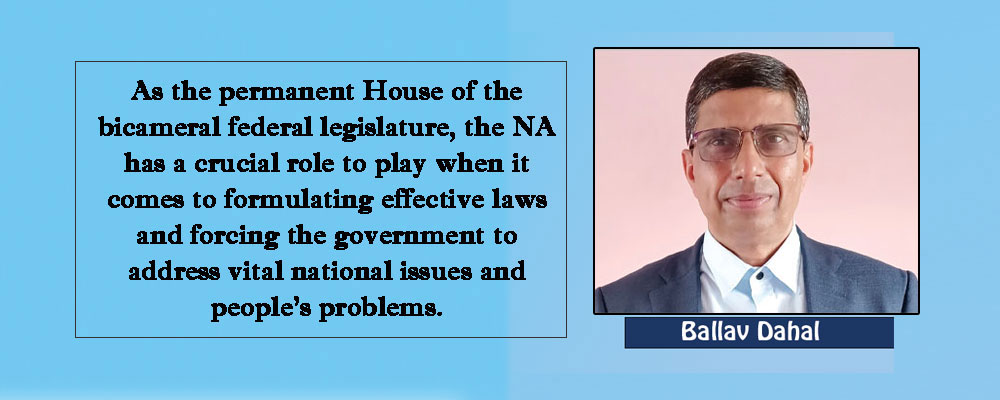- Thursday, 19 February 2026
Enhance National Assembly’s Dignity
The National Assembly (NA) is going to have 20 new faces soon. The election for 19 members is scheduled to be held on January 25 while the remaining one member will be nominated by the President on the recommendation of the federal government. The 19 seats will remain vacant from March 3. The constitution has a provision of an electoral college that elects 56 of the 59-member Upper House of the federal parliament. Three members are nominated by the President. The permanent House has two years’ term for 19 of its members while another 20 have four years’ tenure and the remaining ones enjoy the full term of six years. So, one-third of its members get elected every two years.
Electoral college
Provincial assembly members, mayors and deputy mayors of municipalities, sub-metropolises and metropolises, and chairpersons and vice-chairpersons of rural municipalities are in the electoral college. Out of 550 provincial assembly members, 549 will vote in the upcoming NA poll. One provincial assembly member from Madhes Province died in September last year. Similarly, a total of 1,498 heads and their deputies of the local bodies will be casting their vote. These elected people’s representatives carry a collective weightage of 57,559. As per the existing law, a vote of the provincial assembly member has a credit of 53 while each of the chiefs and deputy chiefs of the local bodies has a value of 19.
A total of 52 candidates belonging to different political parties are now in the election fray. The ruling parties — Nepali Congress, CPN-Maoist Centre, CPN-Unified Socialist and Janata Samajbadi Party (JSP)—have fielded their common candidates for NA seats. According to a deal reached among the ruling parties, NC has 10 candidates while the CPN-Maoist Centre has six. The CPN-Unified Socialist and JSP have fielded two and one candidates, respectively. Considering the fact that the ruling parties hold a majority in all the provinces, they are likely to sweep NA poll this time. However, the CPN-UML, Rastriya Prajatantra Party, Janamat Party and Nepal Workers’ and Peasants’ Party are contesting the poll without forging any coalition.
The Election Commission (EC) has put election code of conduct in force for the NA poll since January 16. The code remains effective for all citizens, government bodies and officials till January 26. The election code stops anyone from using public resources for or against any poll candidate. It also prohibits distortion of election-related contents and information. Public institutions, including schools, and publications cannot be used as spaces for electioneering. Besides, the code does not allow anyone to produce, sell and distribute publicity of material bearing election symbols of any party/candidate or party logos. The poll code also puts a ban on the use of children for campaigning. No one is allowed to damage character of women, senior citizen, disabled people and community of sexual and gender minorities.
The code also bars candidates, other individuals and political parties from disseminating false, misleading and hateful information through social media as well. It does not let anyone look down on candidates with an intention of impacting the poll. With the permission from the election body, ministers from federal and provincial governments and office bearers of the public offices can take part in canvassing. But they are not allowed to use government resources during election campaigns. As the permanent House of the bicameral federal legislature, the NA has a crucial role to play when it comes to formulating effective laws and forcing the government to address vital national issues and people’s problems.
But this House has not only lost its dignity but has also failed to act as per the spirit of the constitution because of the political parties’ tendency of choosing unbecoming candidates. However, in the initial phase, the Upper House had got comparatively better members. The constitution has envisaged NA as a club of experts contributing to various fields. But things have worsened because the political parties seem to have started picking their hard core cadres as candidates for NA members in place of specialists, intellectuals, experienced personalities and those having higher social repute. This sort of deviation has badly affected the NA’s functioning.
Criticism
Looking at the list of NA members elected or nominated over the past few years, there is nothing to be satisfied with. Those who had lost elections to the House of Representatives have been serving as NA members. Incumbent Deputy Prime Minister and Home Minister Narayan Kaji Shrestha and Bamdev Gautam were brought to the Upper House after having lost elections to the Lower House. What is more mocking is that even a ward member candidate from Sindhupalchowk district is still working as NA member. Despite much criticism from public, the political parties appear to have repeated the same mistake. NC leader Krishna Prasad Sitaula, who lost parliamentary election from Jhapa-3 in November 2022, has now fielded his candidacy for a NA member. When such ‘lucky’ individuals are in abundance in the legislature, the nation is less likely to move ahead on the path of progress.
The party leaderships must have worked towards developing the NA into a chamber of experts and those having a lot of experience in different fields so as to enable it to function properly. But owing to a lack of sincerity and seriousness on the part of political leaderships, the NA has turned out to be a place to manage political cadres and those who are close to them.
(The author is a former deputy executive editor of this daily.)














-original-thumb.jpg)

